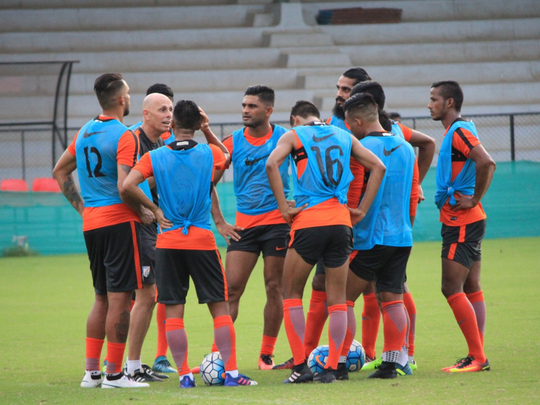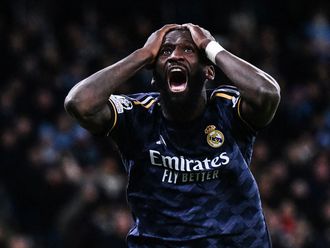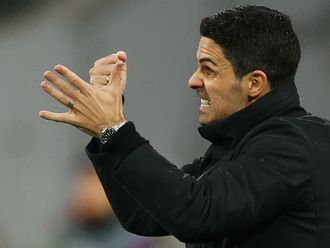
Dubai: India’s footballing revolution is in full swing and there is no turning back, according to their national team coach Stephen Constantine.
The 54-year-old who has managed more national teams than any other Englishman – five, including Nepal, Malawi, Sudan, Rwanda and India twice – returned to manage the cricket-mad nation of 1.3 billion back in 2015 when they were 173rd in the world, their lowest ever position in the Fifa rankings.
Fast forward two years and the Blue Tigers have just set a new most wins record of nine in a row, are on the verge of qualifying for their fourth Asian Cup, and are just four positions off surpassing their highest ever ranking of 94th, which was set 21 years ago.
From next year, the razzmatazz Indian Super League (ISL), which has attracted some of the game’s biggest stars, will merge with the lesser-resourced but officially recognised I-League, to forge a stronger domestic set-up; and the Fifa Under-17 World Cup, the highest profile international football tournament to be held in the country, also kicks-off in October (6-28).
“The revolution has begun and there’s absolutely no turning back,” Constantine told Gulf News. “Interest is huge and the ISL has had a large part to play in that.
“Getting the Under-17 World Cup has also forced the country to get their facilities in place. But it’s the national team that’s really driving everything at the moment and that’s something all Indians can be proud of.”
If India win their next two Asian Cup qualifiers both away and at home to Macau on September 5 and October 10, they will qualify for the 2019 Asian Cup in the UAE.
This would be only their fourth appearance in the competition, after finishing runners-up in 1964 and failing to get out of the group in 1984 and 2011.
“That would be enormous,” added Constantine. “They’ve done it before [in 2011] but that was a completely different format [through winning the 2008 AFC Challenge Cup] and that was held entirely in India, whereas what we have done is quite different.
“Hopefully then with the new league and more quality coaches coming in as well it will increase the level of competition and give the national team coach more choice. From there India needs to qualify for the Asian Cup on a more regular basis to be in a position to qualify for the World Cup.” – they qualified once in 1950 but withdrew.
How has Constantine turned things around for India? “It’s never about just one person. I’ve been lucky to have great people around me, a physio to get players on the pitch and a sports scientist to keep them there. Our mental side has improved – we are coming back from goals down now, which never used to happen - and we’ve developed a scouting network all over the country.
“For me, I knew the mentality, and could hit the ground running [having initially led India in his first spell from 2002 to 2005]. I was able to get straight in and do what needed to be done, I didn’t need six months to find my feet and that was an advantage. It enabled me to get the right people in place. I already had a good feel for the country, so it was easier for me because I had the contacts and could surround myself with like-minded people.
“The average age of our squad when I took over was 30-31, but now it’s 23-24. I’ve given 35 players their international debut and there’s competition with players fighting for places. When you have that it makes for good progress and now India has a team for the next 5-6 years.”
Will that future involve Constantine? “I take a job thinking I’ll be there for the rest of my life, that’s why I get so involved in youth and scouting, because I want things to be right. My contract is up in March and I’ve been in this business too long to think that far ahead. Let’s qualify first and if I qualify maybe I’ll have a decision to make or not. Other opportunities might arise, you don’t know, I can’t say I’ll be here for the next two, three or four years, because I don’t have that in my hand.”
Constantine’s recent autobiography ‘From Delhi to the Den’, the story of football’s most travelled coach, documents his jet-setting adventures, but also highlights the lack of opportunities for English coaches in the UK, where he has yet to have been given a managerial break.
“If an opportunity in England doesn’t come up it doesn’t mean I’ve had a bad career, I’ve had a brilliant career and I’m 55 in October, so I still have 10-15 more years left ahead of me.
“Am I getting more gratification here than I would by taking a team from League One to the Championship in England? I don’t know. I love what I do and I don’t care where I do it, so long as I’m doing what I’m doing.
“Everywhere I go I want to prove myself and everywhere I go I will have problems, they will just be different types of problems. That’s not to say I wouldn’t know how to handle them,” he said of the perception that he is typecast into the role of just coaching developing nations in times of strife.
“I guess I’m a bit of a rolling stone but there will come a time where I will want to settle down in one place, but I don’t have in the forefront of my mind that I have to go back, and would I miss being on the road? I don’t know, because I’m not at home, so it’s difficult for me to say.”












